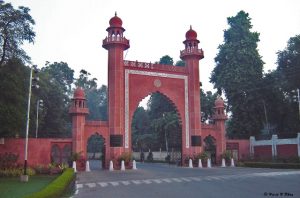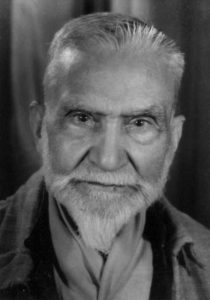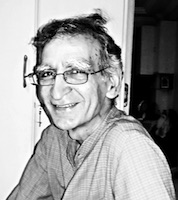The attempt by BJP and its sister organizations to hold a memorial function in honour of Raja Mahendra Pratap on the campus of Aligarh Muslim University was successfully deflected by the vice-chancellor with the plan for a seminar on the AMU almunus’ contribution to the freedom movement. The BJP had dug up this icon from pages of history, having realised that people still respected him decades after his death. The answer to why now, at this particular juncture, is very revealing.
 Raja Mahendra Pratap died on 29 April 1979, and now out of the blue, the BJP seems to have felt that his Hindu, Jat identity can be pitched as a flag of their politics. Mahendra Pratap was a freedom fighter extraordinaire, a journalist and a writer. He was a humanist, believing in an international federation of nations transcending national and religious boundaries. He was a Marxist who called for social reforms and empowerment of the panchayats. He was president of Indian Freedom Fighters’ Association. In 1915, in Kabul, he set up the first provisional Indian government in exile. Just to recall, the Indian National Congress adopted the goal of absolute independence for India much later – in its 1929 session. This provisional government was called Hakumat-i-Moktar-i-Hind, and was constituted with Mahendra Pratap as president, Maulvi Barkatullah as prime minister and Maulana Obaidullah Sindhi as interior minister.
Raja Mahendra Pratap died on 29 April 1979, and now out of the blue, the BJP seems to have felt that his Hindu, Jat identity can be pitched as a flag of their politics. Mahendra Pratap was a freedom fighter extraordinaire, a journalist and a writer. He was a humanist, believing in an international federation of nations transcending national and religious boundaries. He was a Marxist who called for social reforms and empowerment of the panchayats. He was president of Indian Freedom Fighters’ Association. In 1915, in Kabul, he set up the first provisional Indian government in exile. Just to recall, the Indian National Congress adopted the goal of absolute independence for India much later – in its 1929 session. This provisional government was called Hakumat-i-Moktar-i-Hind, and was constituted with Mahendra Pratap as president, Maulvi Barkatullah as prime minister and Maulana Obaidullah Sindhi as interior minister.
Web of falsehood
After Independence he also entered the electoral arena, where he defeated Atal Bihari Vajpayee in Mathura in the 1957 Lok Sabha election. His commitment to fighting communal forces could not have been more evident than his standing against the leader of Bhartiya Jansangh, Vajpayee. The BJP claims that if Mahendra Pratap had not donated his land, AMU would not have come up. This is contrary to the facts. The predecessor of AMU, Mohammadan Anglo-Oriental (MAO) College, was built in 1886, on land bought from the British cantonment (nearly 74 acres) and much later, in 1929, Mahendra Pratap leased 3.04 acres of land to the university. This is called Tikonia ground and is today used as a playground by the City High School of AMU.
Mahendra Pratap joined the MAO College in 1895 and left in 1905 without completing his graduation. In 1920, MAO became Aligarh Muslim University, which regards Raja Mahendra Pratap Singh as an alumnus. In 1977, AMU, then under vice-chancellor Prof A. M. Khusro, felicitated Mahendra Pratap at the centenary celebrations of MAO.
 Raja Mahendra Pratap wasn’t even born when MAO was established, and there is no record of any donation of land from him. Mahendra Pratap’s father, Raja Ghanshyam Singh of Mursan, had a hostel room – Room Number 31 in Sir Syed Hall (South) – built in the college.
Raja Mahendra Pratap wasn’t even born when MAO was established, and there is no record of any donation of land from him. Mahendra Pratap’s father, Raja Ghanshyam Singh of Mursan, had a hostel room – Room Number 31 in Sir Syed Hall (South) – built in the college.
The BJP demanded that AMU celebrate Mahendra Pratap’s birth anniversary just as it does university founder Sir Syed’s. When RSS functionaries and BJP leaders put pressure on him, the vice-chancellor said that AMU cannot celebrate the birth anniversary of every donor or alumnus but that it recognizes their contribution to the building of the university. A photo of Mahendra Pratap already hangs on a wall in the university along with the photo of Sir Syed.
Politics of tension
The Uttar Pradesh BJP chief directed the Aligarh district unit to celebrate the birth anniversary of Mahendra Pratap on the AMU campus. While the raja is also a Jat icon, AMU is seen as a Muslim institution. The Jat-Muslim conflict instigated by communal forces, which took a violent turn in Muzaffarnagar in 2013, continues to haunt western UP. The plan was to appropriate one more icon and accuse the state government of appeasing Muslims if it tried to stop the celebrations.
Vice-Chancellor Lt Gen Zamiruddin Shah’s suggestion of organizing a seminar on Mahendra Pratap’s contribution to the Indian freedom movement on his birth anniversary appeared to have defused the tension. The BJP had planned a rally outside the gate of AMU, which would have precipitated unwarranted incidents.
This whole episode has many lessons for society. To begin with, national icons are being co-opted to suit the interests of communal politics. Be it Sardar Patel, Swami Vivekanand, Mahatma Gandhi or, in this case, Raja Mahendra Pratap, they are being presented in a light that adds fuel to the communal politics. Mahendra Pratap, who was actually a Marxist internationalist and someone who opposed the politics in the name of religion, is being talked about as a mere Jat leader.
Published in the February 2015 issue of the Forward Press magazine
Forward Press also publishes books on Bahujan issues. Forward Press Books sheds light on the widespread problems as well as the finer aspects of the Bahujan (Dalit, OBC, Adivasi, Nomadic, Pasmanda) community’s literature, culture, society and culture. Contact us for a list of FP Books’ titles and to order. Mobile: +919968527911, Email: info@forwardmagazine.in)





